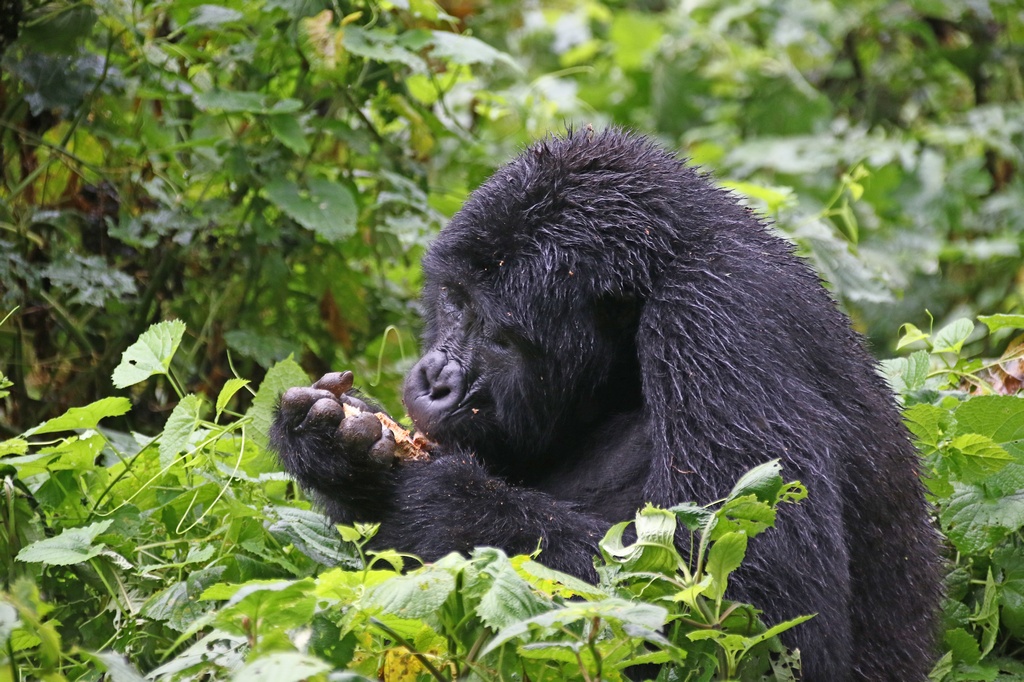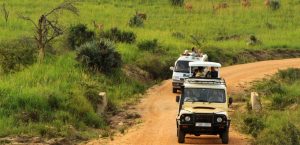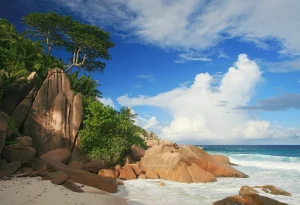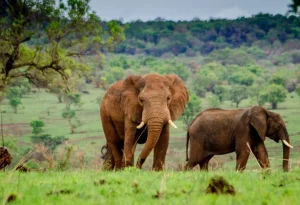Rwanda, known as the “Land of a Thousand Hills,” offers one of the most unforgettable safari experiences in Africa. Its lush landscapes, warm hospitality, and rare wildlife encounters make it a must-visit for nature lovers and adventure seekers alike. But if you’re considering a safari in Rwanda, you likely have many questions: What kind of animals will I see? When is the best time to go? How much does it cost? This guide provides clear, detailed answers to those questions. What Can I Expect from a Safari in Rwanda?
What Wildlife Can I See on a Safari in Rwanda?
Rwanda is best known for its mountain gorillas, which attract thousands of tourists each year to Volcanoes National Park. But Rwanda’s safari offerings go far beyond gorilla trekking. Depending on your chosen park, you can encounter:
-
Gorillas and Golden Monkeys in Volcanoes National Park.
-
Chimpanzees and Colobus Monkeys in Nyungwe Forest.
-
Lions, Elephants, Rhinos, Giraffes, Buffalo, Hippos, and a variety of antelope species in Akagera National Park.
-
Over 700 species of birds, making it a birdwatcher’s paradise.
Each of Rwanda’s national parks offers a unique safari experience, allowing you to tailor your itinerary to your interests, whether it’s primates, big game, or tropical birds.
When Is the Best Time to Go on a Safari in Rwanda?
One of the most frequently searched questions about Rwandan safaris is: “What is the best time to go?” Rwanda experiences a temperate climate, which means you can visit year-round. However, certain times are more ideal based on weather conditions and wildlife activity.
-
June to September: This is the dry season and the most popular time for gorilla trekking and general wildlife viewing. Trails are less muddy, and animals are easier to spot.
-
December to February: Another dry period, great for primate tracking and safaris in Akagera National Park.
-
March to May and October to November: These are the rainy seasons. Although trekking can be more challenging, these months offer fewer crowds and lush green landscapes for photography.
Booking during the dry seasons is highly recommended, especially if gorilla trekking is a priority.
How Much Does a Rwanda Safari Cost?
Another common query is, “How expensive is a safari in Rwanda?” The cost depends on your travel style, length of stay, and chosen activities.
-
Gorilla Trekking Permit: $1,500 per person (mandatory fee issued by the Rwanda Development Board).
-
Chimpanzee Tracking Permit: $60–$90 per person.
-
Akagera National Park Entry: Approximately $50 per adult, plus optional guided tour fees.
Accommodation varies widely:
-
Budget Travelers: $50–$100 per night.
-
Mid-Range: $150–$300 per night.
-
Luxury Lodges: $700 and above per night.
A full safari package including transportation, guides, accommodation, and activities typically starts from $2,500 per person for a 5–7 day trip.
What Should I Pack for a Safari in Rwanda?
Being properly equipped can make or break your safari experience. So what should you pack?
Clothing:
-
Lightweight, neutral-colored clothing (avoid bright colors and camouflage).
-
Long-sleeved shirts and long pants to protect against insects and sun.
-
Waterproof jacket or poncho (especially during rainy seasons).
-
A warm fleece or jacket for chilly mornings.
Footwear:
-
Sturdy hiking boots for gorilla or chimpanzee trekking.
-
Comfortable walking shoes for around camps or towns.
Essentials:
-
Sunscreen and insect repellent.
-
Reusable water bottle and hydration tablets.
-
Travel medical kit.
-
Binoculars and a good-quality camera (no flash allowed during gorilla treks).
-
Passport, travel insurance, and copies of your permits.
What Types of Accommodation Are Available?
Rwanda offers a broad range of accommodations to fit every budget and comfort level. Here’s what you can expect:
Luxury Lodges:
-
Bisate Lodge, Singita Kwitonda, and One&Only Nyungwe House provide all-inclusive luxury, private guides, gourmet meals, and often eco-conscious designs.
-
Ideal for honeymooners, wildlife photographers, and travelers looking for high-end comfort and exclusive experiences.
Mid-Range Hotels:
-
Lodges like Five Volcanoes Boutique Hotel and Mantis Akagera Game Lodge offer quality service, great food, and comfortable amenities at more accessible prices.
Budget Guesthouses:
-
Options like Red Rocks Rwanda or Discover Rwanda Hostel cater to backpackers and eco-tourists. They offer clean rooms, local meals, and a strong community vibe.
Regardless of your budget, it’s best to book accommodation several months in advance, especially during peak safari seasons. What Can I Expect from a Safari in Rwanda?
What Are the Most Popular Safari Parks in Rwanda?
Each park in Rwanda offers a distinct ecosystem and experience.
1. Volcanoes National Park
This is Rwanda’s crown jewel for gorilla trekking. With experienced guides and limited permits to reduce human impact, it offers one of the most intimate wildlife experiences on the planet. Treks can last 1 to 6 hours depending on the location of the gorilla family you’re assigned.
2. Nyungwe Forest National Park
A haven for chimpanzee trekking, Nyungwe also features canopy walks, bird watching, and other primate encounters. It’s one of the oldest rainforests in Africa, filled with rich biodiversity and scenic hiking trails.
3. Akagera National Park
If you’re looking for a classic Big Five safari, this is the place. Located in the eastern part of Rwanda, Akagera is a mixture of savannah, wetlands, and rolling hills. Game drives, boat safaris, and guided walking tours are all available here.
Is a Safari in Rwanda Safe?
Yes. Rwanda is considered one of the safest countries in Africa for tourists. The government has made substantial investments in security, conservation, and tourism infrastructure. Park rangers are highly trained, and the country enforces strict guidelines to protect wildlife and visitors alike. Nevertheless, it’s wise to follow common-sense precautions like keeping valuables secure and staying informed through your tour operator. What Can I Expect from a Safari in Rwanda?
Are There Cultural Experiences Included in a Rwanda Safari?
Absolutely. Cultural immersion is a growing component of Rwanda’s tourism offerings. Some popular options include:
-
Iby’Iwacu Cultural Village near Volcanoes National Park, where visitors can engage in traditional dance, cooking, and storytelling.
-
Local homestays where you can experience life with Rwandan families.
-
Visits to local tea plantations or craft cooperatives, particularly near Nyungwe Forest.
Adding cultural experiences to your itinerary provides a deeper understanding of Rwanda’s heritage and helps support local communities.
Do I Need to Book My Safari in Advance?
Yes, especially for gorilla trekking. Permits are limited and in high demand. It’s advisable to:
-
Book 3 to 6 months in advance for gorilla trekking during the dry seasons.
-
Secure accommodation, transportation, and guides early to avoid last-minute price hikes or unavailability.
Is a Safari in Rwanda Worth It?
If you’re wondering, “Is a safari in Rwanda really worth the investment?”—the answer is a resounding yes. Rwanda delivers a truly unique and meaningful safari experience. From tracking mountain gorillas in misty forests to exploring savannahs teeming with wildlife and engaging with vibrant local cultures, a Rwandan safari is far more than just a vacation—it’s a journey of transformation. What Can I Expect from a Safari in Rwanda?




